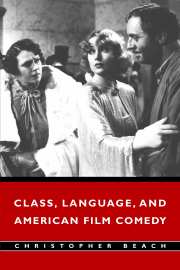Book contents
- Frontmatter
- Contents
- Acknowledgments
- Introduction
- 1 A Troubled Paradise: Utopia and Transgression in Comedies of the Early 1930s
- 2 Working Ladies and Forgotten Men: Class Divisions in Romantic Comedy, 1934–1937
- 3 “The Split-Pea Soup and the Succotash”: Frank Capra's 1930s Comedies and the Subject of Class
- 4 Is Class Necessary?: Preston Sturges and Howard Hawks in the Early 1940s
- 5 Desperately Seeking Status: Class, Gender, and Social Anxiety in Postwar Hollywood Comedy
- 6 Is There a Class in This Text?: Woody Allen and Postmodern Comedy
- 7 Yuppies and Other Strangers: Class Satire and Cultural Clash in Contemporary Film Comedy
- Notes
- Works Cited
- Index
1 - A Troubled Paradise: Utopia and Transgression in Comedies of the Early 1930s
Published online by Cambridge University Press: 02 December 2009
- Frontmatter
- Contents
- Acknowledgments
- Introduction
- 1 A Troubled Paradise: Utopia and Transgression in Comedies of the Early 1930s
- 2 Working Ladies and Forgotten Men: Class Divisions in Romantic Comedy, 1934–1937
- 3 “The Split-Pea Soup and the Succotash”: Frank Capra's 1930s Comedies and the Subject of Class
- 4 Is Class Necessary?: Preston Sturges and Howard Hawks in the Early 1940s
- 5 Desperately Seeking Status: Class, Gender, and Social Anxiety in Postwar Hollywood Comedy
- 6 Is There a Class in This Text?: Woody Allen and Postmodern Comedy
- 7 Yuppies and Other Strangers: Class Satire and Cultural Clash in Contemporary Film Comedy
- Notes
- Works Cited
- Index
Summary
Although Hollywood films of the Depression era would never take the vanguard of social critique, they exerted a powerful influence on the way Americans perceived their place within an increasingly divided society. Social commentators of the late 1920s and early 1930s saw film as a way of exposing class disparities. The movies were a potential means of “undermin[ing] the ideological structure of the middle,” of “consolidat[ing] the working class,” and of bringing the artist and intellectual into direct contact with the masses.
Among the genres of Hollywood film, comedy was to prove one of the most effective in reflecting the social crises of the Depression era. Although Depression comedies may not have satisfied the desires of critics like Dwight MacDonald and Robert Gessner for a socially engaged cinema, they did provide a commentary on wealth, power, and class privilege that functioned as a popular indicator of current social perspectives. Hollywood responded to the ideologically charged early years of the Depression with two very different kinds of comedy, each of which exploited the possibilities of cinematic speech but which used spoken language for very different purposes.
The first of these comic modes was exemplified by two films made by Ernst Lubitsch in the early 1930s: Trouble in Paradise (1932) and Design for Living (1933). In these films, a smooth, effortless, and highly stylized use of language becomes an end in itself, as the brilliantly witty dialogue of the central characters displaces the need for any direct treatment of social issues.
- Type
- Chapter
- Information
- Class, Language, and American Film Comedy , pp. 17 - 46Publisher: Cambridge University PressPrint publication year: 2002



